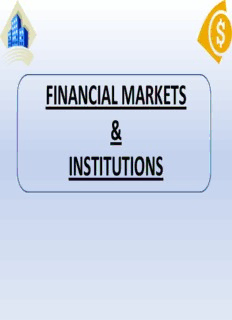
FINANCIAL MARKETS & INSTITUTIONS - Easyonlinebooks PDF
Preview FINANCIAL MARKETS & INSTITUTIONS - Easyonlinebooks
FINANCIAL MARKETS & INSTITUTIONS UNIT-I 2 Financial Markets and Institutions BASIC CONCEPTS & TERMS Market – Place for trading of goods and services. Financial market – Markets in which funds are transferred from people who have an excess of available funds to people who have a shortage of funds. Security – A claim on the issuer’s future income. Bond – Debt security that promises to make payments periodically for a specified period. Interest rate – Cost of borrowing or the price paid for the rental of funds. Common stock/ stock – A share of ownership in a corporation. Foreign exchange market – Funds are converted from one currency into another. It determines the foreign exchange rate. Financial intermediaries – institutions that borrow funds from people who have saved and make loans to other people. E-Finance – Delivering financial services electronically. Banks – Financial institutions that accept deposits and make loans. ESOP - A trust established by a corporate which acts as a tax-qualified, defined- contribution retirement plan by making the corporation's employees partial owners. contributions are made by the sponsoring employer, and can grow tax- deferred, just as with an IRA or 401(k). But unlike other retirement plans, the contributions must be invested in the company's stock. 3 Reverse split - A stock split which reduces the number of outstanding shares and increases the per-share price proportionately. This is usually an attempt by a company to disguise a falling stock price, since the actual market capitalization of the stock does not change at all. For example, if a company declares a one-for-ten reverse split, then a person who previously held 20 shares valued by the market at $1 each will then have 2 shares worth $10 each. Float - The number of shares of a security that are outstanding and available for trading by the public. The amount of money or time represented by checks that are in transit between deposit and payment, or credit card purchases that are between the purchase and the payment. GDR - A negotiable certificate held in the bank of one country representing a specific number of shares of a stock traded on an exchange of another country. American Depositary Receipts make it easier for individuals to invest in foreign companies, due to the widespread availability of price information, lower transaction costs, and timely dividend distributions. also called European Depositary Receipt. Double taxation - Taxation of the same earnings at two levels. One common example is taxation of earnings at the corporate level and then again at the shareholder dividend level. Another example is taxation of foreign investments in the country of origin and then again upon repatriation, although many countries have signed agreements to prevent this latter type of double taxation. Market maker - A brokerage or bank that maintains a firm bid and ask price in a given security by standing ready, willing, and able to buy or sell at publicly quoted prices (called making a market). These firms display bid and offer prices for specific numbers of specific securities, and if these prices are met, they will immediately buy for or sell from their own accounts. 4 CHAPTER-1 INDIAN FINANCIAL SYSTEM & RECENT REFORMS IN THE INDIAN CAPITAL MARKET 5 Financial System Financial System of a country consists of a network of an interconnected system of markets, institutions and services. • This system contributes to the economic development of a country. • The main function of the financial system are to encourage savings and to transfer them efficiently into investments. • Various components of financial system are: - Financial Institutions - Financial Markets - Financial Instruments - Financial Services 6 Flow of funds in financial system 7 Functions of a Financial System Financial System aims at establishing a regular, smooth, efficient and cost effective link between savers and investors. The financial system performs the following functions: – Efficient transformation of Funds. – Creating innovative schemes for savings & investments. 8 Components of a Financial System 1. Financial Institutions 2. Financial Markets 3. Financial Instruments 4. Financial Services 9 1.Financial Institutions Mobilization of savings and transformation of direct claims in indirect are the focus of financial institutions. They can be Classified as • Intermediaries - Banks - Non Banks • Non-intermediaries • Others 10
Description: